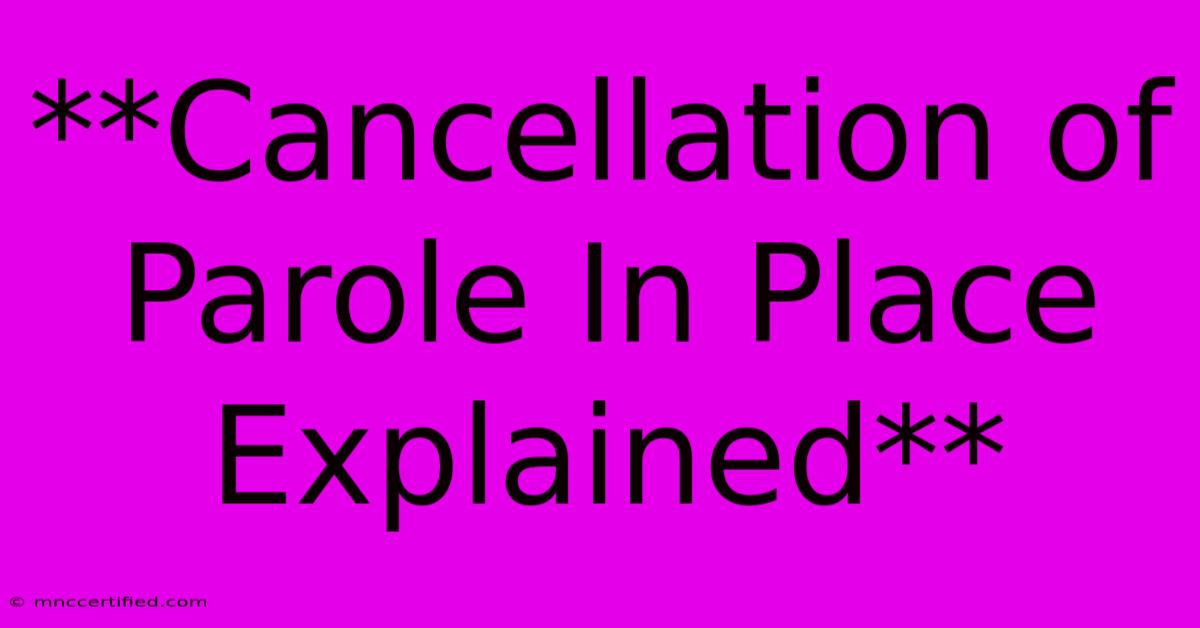**Cancellation Of Parole In Place Explained**

Table of Contents
Cancellation of Parole In Place Explained: Understanding This Complex Legal Process
Parole is a conditional release from prison that allows an offender to serve the remainder of their sentence in the community. It's a crucial part of the criminal justice system, aiming to aid rehabilitation and reduce prison overcrowding. However, what happens when a parolee violates the terms of their release? In such cases, cancellation of parole might be considered, a complex process with significant consequences for the individual.
This article will delve into the intricacies of cancellation of parole in place, clarifying its meaning, the reasons it may occur, and the implications for the parolee.
What is Cancellation of Parole In Place?
Cancellation of parole in place, also known as revocation of parole or parole violation, signifies the official termination of the parole agreement. This essentially means the parolee is returned to prison to complete the remaining portion of their original sentence.
Reasons for Cancellation of Parole
Cancellation of parole isn't taken lightly. Several reasons can lead to this action, commonly categorized as:
1. Technical Violations: These are infractions that don't necessarily involve new criminal activity but breach the terms of the parole agreement. Some examples include:
- Failing to report to a parole officer: This includes missed appointments or failing to provide required information.
- Leaving the jurisdiction: This could involve traveling outside the designated area without permission.
- Substance abuse: Using illegal drugs or failing to comply with mandated drug testing.
- Failure to maintain employment or education: Not meeting the terms of the parole agreement regarding employment or educational pursuits.
2. New Criminal Offenses: If a parolee commits a new crime while on parole, it will likely result in cancellation. This could include:
- Felonies or misdemeanors: Depending on the severity of the crime, even minor offenses can lead to cancellation.
- Domestic violence: Any form of abuse against a family member can lead to revocation.
- Assault: Physical attacks or threats of violence against others.
The Process of Cancellation of Parole
The process of cancelling parole is often initiated by the parole officer who monitors the parolee. They may recommend revocation to the parole board based on observed violations. The parolee is entitled to due process, which typically involves:
- Notification: The parolee will be officially informed of the potential cancellation and the alleged violations.
- Hearing: A hearing is conducted where the parolee can present their defense and challenge the allegations.
- Decision: The parole board makes a decision based on the evidence presented. If the cancellation is confirmed, the parolee is returned to prison.
Implications of Cancellation of Parole
Cancellation of parole carries several implications for the individual:
- Returning to prison: The individual will be required to serve the remaining portion of their original sentence.
- Longer sentence: If the parole board determines that the violation was significant, they might impose a longer sentence.
- Increased supervision: Upon release from prison, the parolee may be subject to more stringent supervision and restrictions.
- Damage to future opportunities: A record of parole violation can significantly impact future employment, housing, and educational opportunities.
Seeking Legal Assistance
Facing cancellation of parole is a complex and challenging legal process. It is strongly recommended to seek legal assistance from a qualified criminal defense attorney. An attorney can:
- Represent you at hearings: Ensure your rights are protected throughout the process.
- Challenge allegations: Present a strong defense against the accusations.
- Negotiate with the parole board: Explore alternative solutions to avoid cancellation.
- Appeal a decision: If the parole board decides to revoke your parole, an attorney can assist with the appeal process.
Conclusion
Cancellation of parole is a serious consequence that significantly impacts an individual's life. Understanding the reasons for cancellation, the legal process involved, and the potential implications can empower individuals to take appropriate action to protect their rights and potentially avoid this outcome. If you are facing a potential cancellation of parole, it is essential to seek legal counsel promptly to navigate this complex legal process effectively.

Thank you for visiting our website wich cover about **Cancellation Of Parole In Place Explained**. We hope the information provided has been useful to you. Feel free to contact us if you have any questions or need further assistance. See you next time and dont miss to bookmark.
Featured Posts
-
Live Rugby Ireland Vs New Zealand Score
Nov 09, 2024
-
Transamerica Occidental Life Insurance
Nov 09, 2024
-
Is Paul Merton Leaving Have I Got News For You Fans React
Nov 09, 2024
-
In House Counsel Malpractice Insurance
Nov 09, 2024
-
Investment Properties Palm Beach County
Nov 09, 2024